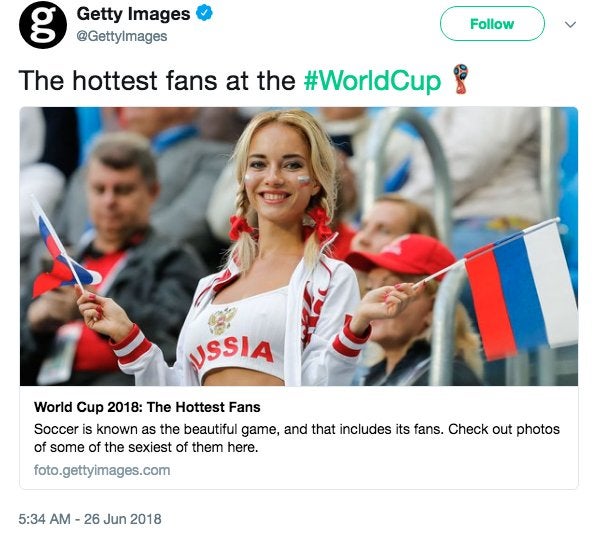World Cup 2018: Getty forced to apologise after posting album of 'sexiest World Cup fans' with only women images
'It’s an insidious way to demean women’s fandom'

Your support helps us to tell the story
From reproductive rights to climate change to Big Tech, The Independent is on the ground when the story is developing. Whether it's investigating the financials of Elon Musk's pro-Trump PAC or producing our latest documentary, 'The A Word', which shines a light on the American women fighting for reproductive rights, we know how important it is to parse out the facts from the messaging.
At such a critical moment in US history, we need reporters on the ground. Your donation allows us to keep sending journalists to speak to both sides of the story.
The Independent is trusted by Americans across the entire political spectrum. And unlike many other quality news outlets, we choose not to lock Americans out of our reporting and analysis with paywalls. We believe quality journalism should be available to everyone, paid for by those who can afford it.
Your support makes all the difference.The Getty picture agency has been accused of "demeaning" women who watch football, after it published an album of the “sexiest World Cup fans” featuring only images of female supporters.
The US-based company which supplies images for businesses and media outlets around the world, was forced to apologise after posting a series of "over-sexualised" photos of young and attractive women under the title “World Cup 2018: The Sexist Fans”.
The pictures were questioned as all the fans featured were women and the company was accused on social media of placing women who watch football in a "decorative" role.

Within hours, Getty removed the album, saying it “did not meet its editorial standards”.
“We regret the error and have removed the piece. There are many interesting stories to tell about the World Cup and we acknowledge this was not one of them,” the company said in a statement.
The incident came just a week after a campaign was launched by photography project “This Fan Girl” to replace the “over-sexualised and non-representative” images which appear at the top of search engines.
Their aim was to encourage people to share news articles containing five images they selected of a diverse group of women football fans, using the hashtag #WeAreFemaleFans in a bid to get them to the top of search engines.
The women behind the campaign said the decision by Getty to publish the album had proven the need for change in the way female football fans were portrayed online and in the mainstream media.
Emma Townley, one of those leading the campaign, told The Independent: “If you google women football fans, you’ll see that all the images are overly sexualised – tight clothing and very exposed. It’s kind of awful.
“We wanted to show that most women don’t subscribe to this. There are fans who go in their big baggy tops with short hair who wear glasses, who are every shape size colour ethnicity. This list from Getty that has come out today is so disappointing. They are the biggest media-selling agency in the world, they are the go-to for brands, advertisers and journalists.
“The World Cup is bringing this to light because it’s now in the press more. We’ve been ticking away on this for the last few years, but this has tipped it over the edge.”
It is the latest in a string of incidents since the start of the World Cup which have shed light on sexist attitudes in football.
On Monday, former Chelsea footballer Jason Cundy claimed on national television that women’s voices are too high-pitched to commentate football matches.
Former West Ham player Patrice Evra was meanwhile accused of being “misogynistic” after reacting to female footballer Eni Aluko‘s analysis of the World Cup on ITV with a "patronising" applaud.
Brazilian female reporter Julia Guimaraes was also widely praised after rebuking a football fan who attempted to kiss her while she was preparing to go live on television in Russia.
Carrie Dunn, football writer and author of the book The Roar of the Lionesses, told The Independent the album published by Getty was a symptom of how women’s fandom is degraded.
“There’s still this idea that women in football are there to look pretty; they’re there with their boyfriends and husbands; they’re there to look at the players. And it’s absolute nonsense, yet it carries on,” she said.
“It’s an insidious way to demean women’s fandom, because these poor girls are at the football, they’re celebrating the world cup. They didn’t know they were going to get picked out by Getty and put in a ‘sexiest fan’ gallery.
“And it’s not men and women in that gallery – it’s just women. There’s this assumption that women are sexy and that’s what we’re there for. We’re decorative. And it’s something that men aren’t because that would be too trivial for them because they’re too important and they’re the real fans.”
Ms Dunn added: “It’s these old-fashioned attitudes and it’s depressing that they still exist. But it’s good that there’s so much outrage and it’s being called out quickly, and people do realise that it’s not okay to be discriminating against women in these ways in 2018.”
Join our commenting forum
Join thought-provoking conversations, follow other Independent readers and see their replies
Comments